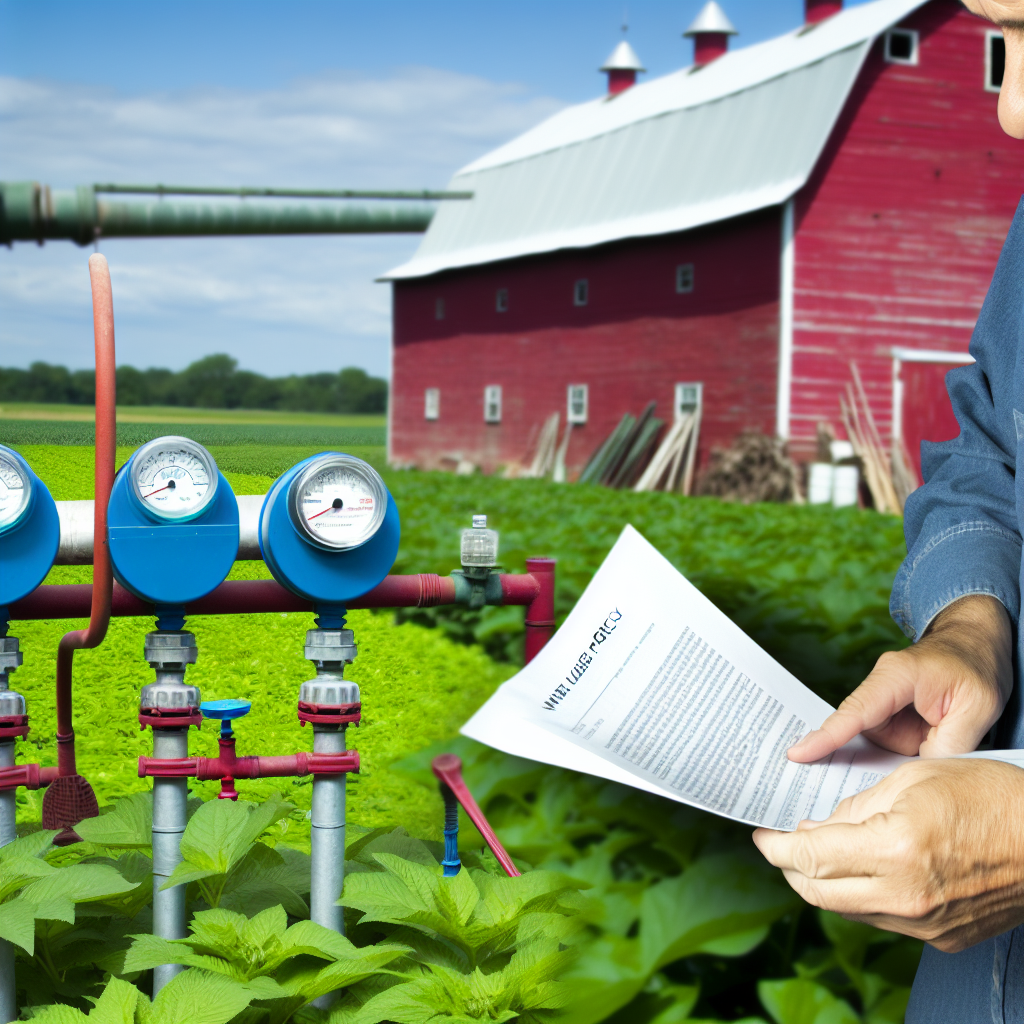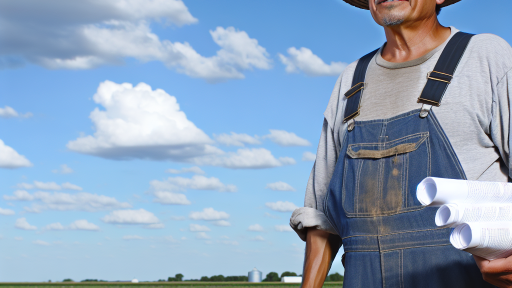Overview of Water Usage Policies in Agriculture
Importance of Water Management
Effective water management is crucial for sustainable agriculture.
Farmers depend on water for crop growth and livestock maintenance.
Additionally, efficient water use enhances productivity and minimizes waste.
Consequently, managing water resources is key to food security.
Types of Water Usage Policies
Various water usage policies govern agricultural practices.
Regulatory frameworks typically include allocation, conservation, and quality standards.
These policies aim to ensure equitable use among farmers.
Moreover, they help protect water quality from agricultural runoff.
Water Allocation Strategies
Water allocation strategies define how resources are distributed among users.
Prioritization often goes to essential crops and livestock needs.
In many regions, farmers must apply for water permits.
This process ensures that water use aligns with sustainability goals.
Conservation Practices
Conservation practices are vital for reducing water usage in agriculture.
Farmers implement irrigation techniques such as drip and sprinkler methods.
Additionally, crop selection plays a role in water conservation.
Transform Your Agribusiness
Unlock your farm's potential with expert advice tailored to your needs. Get actionable steps that drive real results.
Get StartedDrought-resistant varieties can significantly decrease water demand.
Quality Standards and Monitoring
Water quality standards are essential for protecting public health.
Farmers must monitor and manage irrigation water quality regularly.
Testing helps identify contaminants that can harm crops or livestock.
Adhering to quality regulations also supports market access.
Impact of Climate Change
Climate change poses significant challenges to water usage policies.
Changing weather patterns affect water availability and distribution.
Farmers must adapt their practices to mitigate these impacts.
Integrated approaches can enhance resilience and reduce vulnerability.
Importance of Sustainable Water Management for Farmers
Guaranteeing Water Availability
Sustainable water management ensures sufficient water supply for farming activities.
This approach helps farmers avoid water shortages during critical growth periods.
In addition, it mitigates drought impacts, enabling stable crop production.
Enhancing Crop Yields
Effective water management strategies lead to improved crop yields.
Farmers utilizing rainwater harvesting can reduce dependency on groundwater.
Consequently, consistent irrigation promotes healthy plant growth and higher outputs.
Protecting Ecosystems
Implementing sustainable practices safeguards local ecosystems.
Water conservation protects nearby rivers and lakes from depletion.
By maintaining natural habitats, farmers support biodiversity in their regions.
Reducing Costs
Efficient water use decreases operational costs for farmers.
Utilizing drip irrigation systems minimizes wastage and maximizes efficiency.
This results in lower utility bills and reduced need for water sourcing.
Compliance with Regulations
Farmers must adhere to governmental water usage regulations.
Sustainable practices foster compliance with environmental laws and standards.
This proactive approach protects farmers from potential fines and legal issues.
Showcase Your Farming Business
Publish your professional farming services profile on our blog for a one-time fee of $200 and reach a dedicated audience of farmers and agribusiness owners.
Publish Your ProfileAdapting to Climate Change
Sustainable management helps farmers adapt to changing climate conditions.
It enhances resilience against unpredictable weather patterns and extreme events.
Farmers can adjust their practices to ensure consistent water availability.
Creating Community Awareness
Farmers play a critical role in educating their communities about water conservation.
By sharing successful strategies, they inspire others to adopt sustainable practices.
This communal effort fosters a shared commitment to environmental stewardship.
Regulatory Framework Governing Water Usage in Agriculture
Overview of Water Regulations
Water regulations play a crucial role in agriculture.
They ensure sustainable water usage on farms.
Various laws govern how farmers access water resources.
These regulations often vary by region and crop type.
Key Regulatory Agencies
Several key agencies oversee water usage in agriculture.
The Environmental Protection Agency (EPA) sets national standards.
Likewise, the U.S. Geological Survey (USGS) provides data and assessments.
In addition, state and local agencies enforce specific regulations.
Water Rights and Permits
Farmers must typically obtain water rights for irrigation.
These rights dictate how much water can be used.
Additionally, permits may be required for new water sources.
Understanding these permits is essential for compliance.
Impact of Drought Policies
Drought policies affect water usage significantly.
During droughts, restrictions may limit water access.
Farmers will often have to adjust their practices accordingly.
This aspect emphasizes the need for flexible water management strategies.
Sustainable Water Practices
Integrating sustainable practices is becoming essential.
Farmers should adopt techniques like drip irrigation.
These methods reduce water wastage and improve efficiency.
Moreover, using rainwater harvesting systems shows promise.
Future Trends in Water Regulation
As climate change progresses, regulations may evolve.
Agencies are increasingly focusing on adaptability.
Farmers should stay informed about potential changes.
Engagement in policy discussions can help shape future regulations.
You Might Also Like: Impact of Tariffs on Agricultural Exports
Best Practices for Efficient Water Usage on Farms
Implementing Drip Irrigation
Drip irrigation delivers water directly to the roots of plants.
This method minimizes evaporation and runoff effectively.
Farmers can save significant amounts of water by using this system.
Additionally, it promotes healthier plant growth and reduces weed proliferation.
Timing Irrigation Correctly
Irrigating at the right times enhances water efficiency.
Watering early morning or late afternoon reduces evaporation losses.
Farmers can analyze weather conditions to optimize their schedules.
Also, using timers can ensure consistency in watering practices.
Utilizing Rainwater Harvesting
Harvesting rainwater helps farmers supplement their water supply.
Showcase Your Farming Business
Publish your professional farming services profile on our blog for a one-time fee of $200 and reach a dedicated audience of farmers and agribusiness owners.
Publish Your ProfileThis practice involves collecting and storing rainwater from roofs.
Farmers can use this water for irrigation and livestock needs.
Moreover, it reduces dependency on municipal water systems.
Adopting Soil Moisture Sensors
Soil moisture sensors provide real-time data about moisture levels.
Farmers can use this information to adjust their irrigation practices.
This technology helps prevent overwatering and under-watering.
As a result, it promotes better overall crop health.
Conducting Regular Audits
Regular audits help identify inefficiencies in water usage.
Farmers should inspect irrigation systems for leaks and clogs.
Addressing these issues can significantly improve water conservation.
Additionally, audits can help train farm staff on best practices.
Engaging in Crop Rotation
Crop rotation increases soil health and moisture retention.
This practice helps break pest cycles and enhances yields over time.
Furthermore, it diversifies planting schedules and irrigation needs.
Farmers can thus optimize their water resources year-round.
You Might Also Like: Benefits Of Organic Certification For Farmers
Impact of Climate Change on Water Resources for Farming
Changing Rainfall Patterns
Climate change alters rainfall patterns globally.
Farmers often face increased uncertainty regarding precipitation.
In some regions, rainfall becomes sporadic and intense.
This leads to water scarcity during critical growing seasons.
Consequently, crops may suffer from insufficient irrigation.
Increased Evaporation Rates
Higher temperatures cause greater evaporation rates from soil and water bodies.
This results in reduced moisture availability for crops.
Farmers must adapt their irrigation strategies to combat this effect.
Utilizing water-efficient practices can help mitigate losses.
Impact on Groundwater Resources
Climate change affects groundwater recharge rates significantly.
Reduced rainfall and increased evaporation lead to declining groundwater levels.
Farmers rely heavily on groundwater for irrigation in many areas.
Over-extraction can make this resource unsustainable over time.
Increased Frequency of Droughts and Floods
Climate change increases the frequency and severity of both droughts and floods.
Droughts limit access to water for farming operations.
Flooding can wash away crops and erode valuable topsoil.
Farmers must prepare for these extreme weather events.
Future Challenges and Adaptations
The ongoing impact of climate change presents future challenges for agriculture.
Farmers need innovative water management solutions to adapt.
Technological advancements can provide new strategies for efficiency.
Government policies must support sustainable practices in agriculture.
Collaboration among stakeholders is crucial to ensure viable farming.
Explore Further: Farm Management and Labor Regulations

Technological Innovations Supporting Water Efficiency in Agriculture
Introduction to Water-Saving Technologies
Water-saving technologies play a crucial role in modern agriculture.
Showcase Your Farming Business
Publish your professional farming services profile on our blog for a one-time fee of $200 and reach a dedicated audience of farmers and agribusiness owners.
Publish Your ProfileFarmers increasingly turn to these innovations for better resource management.
These technologies help reduce water consumption and improve crop yields.
Precision Irrigation Systems
Precision irrigation systems optimize water use effectively.
These systems deliver the right amount of water at the right time.
Drip irrigation, for instance, minimizes water waste significantly.
Farmers can adjust these systems based on real-time data.
This adaptability enhances crop resilience and productivity.
Soil Moisture Sensors
Soil moisture sensors monitor water levels accurately.
These sensors provide critical data for irrigation planning.
Farmers can schedule watering based on actual soil needs.
This practice leads to significant water savings and healthier plants.
Weather Forecasting Tools
Weather forecasting tools support informed decision-making.
Farmers can anticipate weather conditions and adjust irrigation schedules.
This proactive approach reduces unnecessary water usage.
Additionally, accurate forecasts help protect crops from extreme weather.
Automated Irrigation Systems
Automated irrigation systems streamline water management tasks.
These systems regulate water flow based on environmental conditions.
Automation reduces labor costs and enhances operational efficiency.
Farmers can focus on other essential aspects of their operations.
Water Recycling Technologies
Water recycling technologies enable the reuse of wastewater.
This innovation promotes sustainable farming practices.
Farmers can treat and recycle water for irrigation purposes.
Recycling reduces dependence on fresh water sources.
The Role of Data Analytics
Data analytics provides valuable insights for water usage optimization.
Farmers can analyze historical data to make informed decisions.
These insights promote efficient irrigation strategies.
Moreover, data analytics helps identify potential water-saving opportunities.
Future Directions in Water Efficiency Technologies
Adopting innovative technologies leads to more efficient water use in agriculture.
Farmers can enhance productivity while conserving vital water resources.
These advancements pave the way for sustainable farming practices.
Future developments will continue to focus on water efficiency.
Delve into the Subject: Managing Trade Barriers in Agriculture
Case Studies: Successful Implementation of Water Policies in Farming
Innovative Water Management in California
In California’s Central Valley, farmers adopted advanced irrigation technologies.
This included drip irrigation systems to enhance water efficiency.
As a result, water usage decreased by over 20% in several farms.
Additionally, the local government provided training for farmers.
This training focused on sustainable practices and efficient water use.
Consequently, crop yields improved while conserving water resources.
Revolutionizing Water Usage in Australia
In Australia, farmers implemented water allocation policies effectively.
The government established a cap-and-trade system for water rights.
Showcase Your Farming Business
Publish your professional farming services profile on our blog for a one-time fee of $200 and reach a dedicated audience of farmers and agribusiness owners.
Publish Your ProfileThis approach encouraged farmers to buy and sell water allocations.
Farmers who conserved water were rewarded financially.
Research showed that this system reduced water usage by 30% on average.
Farmers also experienced increased profitability through sustainable practices.
Successful Implementation in Israel
Israel has long been a pioneer in water-efficient agriculture.
Farmers utilize a combination of drip irrigation and recycling wastewater.
This has led to impressive reductions in water consumption.
Moreover, the government invests in research and development for new technologies.
For example, smart irrigation systems monitor soil moisture levels.
This ensures that crops receive the precise amount of water needed.
Community Efforts in Kenya
In Kenya, farmers formed cooperatives to manage water resources collaboratively.
These cooperatives focus on rainwater harvesting and storage systems.
They share best practices to maximize water use efficiency.
As a result, many communities achieved food security during dry seasons.
Furthermore, training programs were established to educate farmers.
These programs emphasized sustainable farming techniques and conservation efforts.
Technological Advancements in the Netherlands
The Netherlands adopted innovative technologies to address water scarcity.
Aquaculture practices now integrate land and water use for higher efficiency.
Farmers monitor water levels and quality in real time using sensors.
Consequently, they adjust their irrigation techniques accordingly.
This efficiency has reduced water usage by approximately 25%.
Overall, these practices enhance productivity while conserving resources.
Challenges and Barriers to Implementing Water Usage Policies for Farmers
Regulatory Framework Issues
Farmers face complex regulatory frameworks that hinder effective water management.
These regulations often vary significantly between regions and can be confusing.
Moreover, lack of clarity in these laws can lead to unintended violations.
Enforcement of these policies can also be inconsistent, creating additional hurdles.
Financial Constraints
Many farmers struggle with limited financial resources to invest in water-saving technologies.
High upfront costs of such technologies can deter implementation.
Additionally, ongoing costs can add financial strain on farmers operating on tight margins.
Consequently, these financial barriers can slow the adoption of better water management practices.
Knowledge and Training Gaps
There is often a lack of adequate training on water management techniques for farmers.
Many agricultural education programs do not address modern practices effectively.
Additionally, limited access to information can prevent proper implementation of policies.
Farmers may lack awareness of available resources that could aid compliance.
Cultural and Social Factors
Cultural attitudes towards water conservation also play a significant role.
Some communities prioritize traditional farming practices over modern regulations.
As such, resistance to change can be a major barrier to policy implementation.
Furthermore, social dynamics within farming communities can influence resource sharing.
Infrastructure Challenges
Many regions lack the necessary infrastructure to support efficient water usage.
Old or inadequate irrigation systems can waste significant amounts of water.
Showcase Your Farming Business
Publish your professional farming services profile on our blog for a one-time fee of $200 and reach a dedicated audience of farmers and agribusiness owners.
Publish Your ProfileMoreover, insufficient access to reliable water sources complicates compliance with policies.
Consequently, farmers may face challenges in adopting sustainable practices.
Climate Variability
Climate change adds unpredictability to water availability for farmers.
Increased droughts and floods can disrupt traditional farming practices.
Such variability complicates the planning and implementation of water usage policies.
Additionally, adapting to these changes requires resources that may be unavailable.
Additional Resources
Agricultural Water Policy / Divisions & Offices / Home – Florida …




